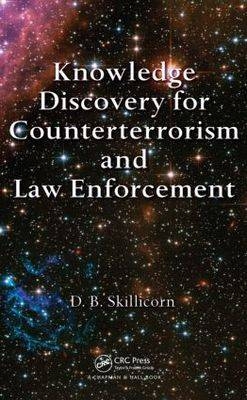
Knowledge Discovery for Counterterrorism and Law Enforcement
Seiten
2008
Crc Press Inc (Verlag)
978-1-4200-7399-7 (ISBN)
Crc Press Inc (Verlag)
978-1-4200-7399-7 (ISBN)
Presents a fresh approach to knowledge discovery in adversarial settings. Focusing on the four main applications areas in knowledge discovery (prediction, clustering, relationship discovery, and textual analysis), this book discusses opportunities for concealment that exist and recommends tactics that can aid in detecting them.
Most of the research aimed at counterterrorism, fraud detection, or other forensic applications assumes that this is a specialized application domain for mainstream knowledge discovery. Unfortunately, knowledge discovery changes completely when the datasets being used have been manipulated in order to conceal some underlying activity. Knowledge Discovery for Counterterrorism and Law Enforcement operates from the premise that detection algorithms must be rethought to be effective in this domain, and presents a new approach based on cutting-edge analysis for use in adversarial settings.
Reveals How Criminals Conceal Information
This volume focuses on four main forms of knowledge discovery: prediction, clustering, relationship discovery, and textual analysis. For each of these application areas, the author discusses opportunities for concealment that are available to criminals and reveals some of the tactics that can aid in detecting them. He reviews what is known about the different technologies for each area and evaluates their effectiveness. The book also supplies a preview of technologies currently under development and describes how they will fit in to existing approaches to knowledge discovery.
Provides Proactive Formulas for Staying One Step Ahead of Adversaries
While all knowledge-discovery systems are susceptible to manipulation, designers and users of algorithmic systems who are armed with the knowledge of these subversive tactics are better able to create systems to avoid these vulnerabilities. This book delineates an effective process for integrating knowledge-discovery tools, provides a unique understanding of the limits of the technology, and contains a clear presentation of the upsides and pitfalls of data collection. It is a powerful weapon in the arsenal of anyone confronting the increasingly sophistic
Most of the research aimed at counterterrorism, fraud detection, or other forensic applications assumes that this is a specialized application domain for mainstream knowledge discovery. Unfortunately, knowledge discovery changes completely when the datasets being used have been manipulated in order to conceal some underlying activity. Knowledge Discovery for Counterterrorism and Law Enforcement operates from the premise that detection algorithms must be rethought to be effective in this domain, and presents a new approach based on cutting-edge analysis for use in adversarial settings.
Reveals How Criminals Conceal Information
This volume focuses on four main forms of knowledge discovery: prediction, clustering, relationship discovery, and textual analysis. For each of these application areas, the author discusses opportunities for concealment that are available to criminals and reveals some of the tactics that can aid in detecting them. He reviews what is known about the different technologies for each area and evaluates their effectiveness. The book also supplies a preview of technologies currently under development and describes how they will fit in to existing approaches to knowledge discovery.
Provides Proactive Formulas for Staying One Step Ahead of Adversaries
While all knowledge-discovery systems are susceptible to manipulation, designers and users of algorithmic systems who are armed with the knowledge of these subversive tactics are better able to create systems to avoid these vulnerabilities. This book delineates an effective process for integrating knowledge-discovery tools, provides a unique understanding of the limits of the technology, and contains a clear presentation of the upsides and pitfalls of data collection. It is a powerful weapon in the arsenal of anyone confronting the increasingly sophistic
Skillicorn, David
Introduction. Data. High-Level Principles. Looking for Risk - Prediction and Anomaly Detection. Looking for Similarity – Clustering. Looking Inside Groups - Relationship Discovery. Discovery from Public Textual Data. Discovery in Private Communication. Discovering Mental and Emotional State. The Bottom Line.
| Erscheint lt. Verlag | 13.11.2008 |
|---|---|
| Reihe/Serie | Chapman & Hall/CRC Data Mining and Knowledge Discovery Series |
| Verlagsort | Bosa Roca |
| Sprache | englisch |
| Maße | 156 x 234 mm |
| Gewicht | 612 g |
| Themenwelt | Mathematik / Informatik ► Informatik ► Datenbanken |
| Informatik ► Theorie / Studium ► Künstliche Intelligenz / Robotik | |
| Sozialwissenschaften ► Politik / Verwaltung | |
| Sozialwissenschaften ► Soziologie | |
| ISBN-10 | 1-4200-7399-0 / 1420073990 |
| ISBN-13 | 978-1-4200-7399-7 / 9781420073997 |
| Zustand | Neuware |
| Haben Sie eine Frage zum Produkt? |
Mehr entdecken
aus dem Bereich
aus dem Bereich
Buch | Softcover (2024)
REDLINE (Verlag)
20,00 €
Eine kurze Geschichte der Informationsnetzwerke von der Steinzeit bis …
Buch | Hardcover (2024)
Penguin (Verlag)
28,00 €


